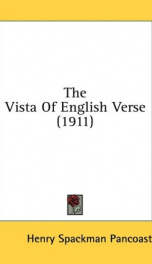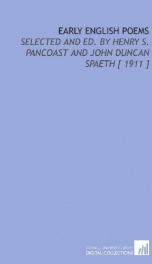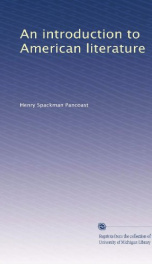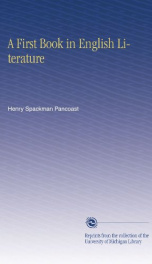an introduction to english literature
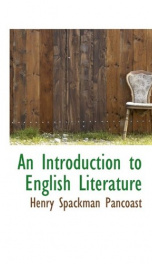
Purchase of this book includes free trial access to www.million-books.com where you can read more than a million books for free. This is an OCR edition with typos. Excerpt from book: II. LITERATURE BEFORE THE NORMAN CONQUEST To this preparation by the making of the race must be added the expanding and deepening of the English nature, which, taught by experience, refined and spiritualized by Christianity and by Latin culture, labored to embody its widening ideas of life in some literary form. To realize the part played by Christianity in the development of English literature we must go back to the preceding centuries of heathenism. Like the early Greeks and other primitive races, the English had created a body of poetry and myth long before they were able to give it a Early Enff. written form. Their imagination had lish heathen- peopled the world about them with lsm. indwelling powers ; the giant of the forest, the dwarf of the mine, Nicor the water-sprite, whose name survives in the nixies of popular song and legend. Their religion seems to have been that of the Scandinavian, impressive in its vast and rough-hewn majesty. Crude, gigantic shapes loom up through this Teutonic mythology as through a cloud : Woden, the father of the gods ; Thor, with his mighty hammer, the god of thunder and of tempest ; Saxneat, the god of war ; and Tiw, the sword god, a fierce and terrible power whom none could encounter and live. Among these are gentler divinities, often personifying the creative and beneficent forces of nature arrayed against the destructive and warring powers of cold, darkness, and storm ; Frea, the divinity of joy, warmth, and harvests ; theradiant and gracious Balder, the sun god ; Eostre, the remnant of a yet earlier mythology, the shining goddess of springtime and dawn, from whose name our Easter is taken. Back of all these is Wyrd, Destiny, including in one person the three attributes Past, Present, and Future, embodiment of that ingrained nort... --This text refers to an alternate Paperback edition.
Users who have this book
Users who want this book
What readers are saying
What do you think? Write your own comment on this book!
write a commentif you like an introduction to english literature try:
Do you want to exchange books? It’s EASY!
Get registered and find other users who want to give their favourite books to good hands!

